NATTOKINASE 'has potent fibrinolytic activity, antihypertensive, anti-atherosclerotic & lipid-lowering, antiplatelet & neuroprotective effects'; TWC 'Spike Recovery' contains NATTO for anti-spike
NATTO is a unique natural compound possessing several key cardiovascular beneficial effects for patients with CVD; therefore an ideal drug candidate for the prevention & treatment of CVD, LONG COVID
Can NATTOKINASE help to dissolve spike protein due to the mRNA technology (or DNA) gene injections? From any of these fraud deadly gene delivery platforms? IMO yes, and evidence has accumulated, and even as the science matures and develops, it is worth considering given its ubiquitous availability in nature, and its safety profile. People need help now as have been damaged from the gene injection and are suffering with LONG-COVID.
I share a substack I wrote prior on NATTOKINASE and The Wellness Company’s (TWC) ‘Spike Recovery’ (see photo above) that may offer some support to persons post COVID virus or mRNA technology gene injection (damage emanating from virus or vaccine given the spike protein is the culprit, though the synthetic modified mRNA itself as well as the LNP fatty ball causes destruction) and the ravages of the toxic endothelial pathogen SPIKE protein; I also include a nice stack by Makis (my Canadian colleague) on benefits of NATTOKINASE. I also include a robust enough Japanese study on benefits of NATTOKINASE. Moreover, I include additional research to support this natural NATTOKINASE enzyme.
Start here:
Note, pregnant women, breast feeding women, children under 18, those on blood thinners should only take this (and should not) after discussing with their physician.
Nattokinase (NK), the most active ingredient of natto, possesses a variety of favourable cardiovascular effects and the consumption of Natto has been linked to a reduction in CVD mortality. Recent research has demonstrated that NK has potent fibrinolytic activity, antihypertensive, anti-atherosclerotic, and lipid-lowering, antiplatelet, and neuroprotective effects….Available evidence suggests that NK is a unique natural compound that possesses several key cardiovascular beneficial effects for patients with CVD…’
SOURCE:
https://journals.sagepub.com/doi/pdf/10.1177/1177271918785130?utm_source=substack&utm_medium=email
Remember this study by Tanikawa et al:
SOURCE:
https://www.mdpi.com/1420-3049/27/17/5405?trk=public_post_comment-text
‘SARS-CoV-2 has a spike protein (S protein), and cleavage of the S protein is essential for viral entry. Nattokinase is produced by Bacillus subtilis var. natto and is beneficial to human health. In this study, we examined the effect of nattokinase on the S protein of SARS-CoV-2. When cell lysates transfected with S protein were incubated with nattokinase, the S protein was degraded in a dose- and time-dependent manner. Immunofluorescence analysis showed that S protein on the cell surface was degraded when nattokinase was added to the culture medium.’
Recall this study by Ruei-Lin Hsu et al.:
SOURCE:
https://pubs.acs.org/doi/pdf/10.1021/jf803072r
‘More than 20 unrelated proteins can form amyloid fibrils in vivo which are related to various diseases, such as Alzheimer’s disease, prion disease, and systematic amyloidosis. Amyloid fibrils are an ordered protein aggregate with a lamellar cross-β structure. Enhancing amyloid clearance is one of the targets of the therapy of these amyloid-related diseases. Although there is debate on whether the toxicity is due to amyloids or their precursors, research on the degradation of amyloids may help prevent or alleviate these diseases. In this study, we explored the amyloid-degrading ability of nattokinase, a fibrinolytic subtilisin-like serine protease, and determined the optimal conditions for amyloid hydrolysis. This ability is shared by proteinase K and subtilisin Carlsberg, but not by trypsin or plasmin.’
Recall this study by Jang et al.:
SOURCE:
https://synapse.koreamed.org/articles/1053773
‘The effects of nattokinase on the in vitro platelet aggregation and in vivo thrombosis were investigated in comparison with aspirin. Rabbit platelet-rich plasma was incubated with nattokinase and aggregation inducers collagen and thrombin, and the platelet aggregation rate was analyzed. Nattokinase significantly inhibited both the collagen- and thrombin-induced platelet aggregations. Nattokinase also reduced thromboxane B2 formation from collagen-activated platelets in a concentration-dependent manner. Rats were orally administered with nattokinase for 1 week, and their carotid arteries were exposed. Arterial thrombosis was induced by applying 35% FeCl3-soaked filter paper for 10 min, and the blood flow was monitored with a laser Doppler probe. Nattokinase delayed the FeCl3-induced arterial occlusion in a dose-dependent manner, doubling the occlusion time at 160 mg/kg. In addition, a high dose (500 mg/kg) of nattokinase fully prevented the occlusion, as achieved with aspirin (30 mg/kg). The results indicate that nattokinase extracted from fermented soybean inhibit platelet aggregation by blocking thromboxane formation, and thereby delay thrombosis following oxidative arterial wall injury. Therefore, it is suggested that nattokinase could be a good candidate without adverse effects for the improvement of blood flow.’
Recall this study by Watanabe et al.:
SOURCE:
https://www.pieronline.jp/content/article/0386-3603/47080/1317
‘This paper presents a sub-group analysis of a previously published study, specifically to document the significant reduction in blood pressure, excluding people from the original study who had Stage 2 hypertension. The study adopted in to assess the efficacy of nattokinae(NSK-SD)is a randomized, double-blind, placebo-controlled, parallel-group clinical study. 79 subjects joined screening for high blood pressure(high-normal blood pressure or high-gradeⅠ hypertension)referring to the study done in Asia. They took placebo or 110 mg nattokinase per day for the 8week study duration. Result 67 subjects were chosen out of 79 subjects in result of screening. Diastolic blood pressure at 8th week in nattokinase group was significantly lower than placebo group(P<0.05). The degree of reduction of diastolic blood pressure in male was significantly different compared with placebo group(P<0.05. No significant difference was found in diastolic blood pressure in women. In Stratified analyses, we found no significant difference in systolic blood pressure in hypertension subject. However, compared with placebo group, significant differences in diastolic blood pressure were found(P<0.05). Conclusion In hypertension subject, nattokinse leads to beneficial changes in blood pressure.’
My prior substacks:
Support William, I know this man, good decent family man, scientist, doctor, hounded by the rabid COVID Taliban in medical world as his depth threatens them:
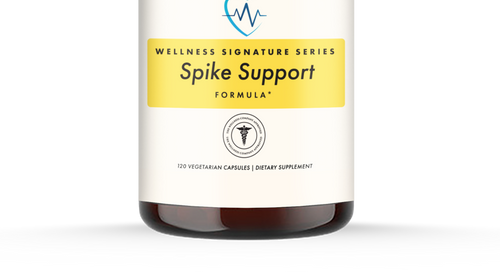





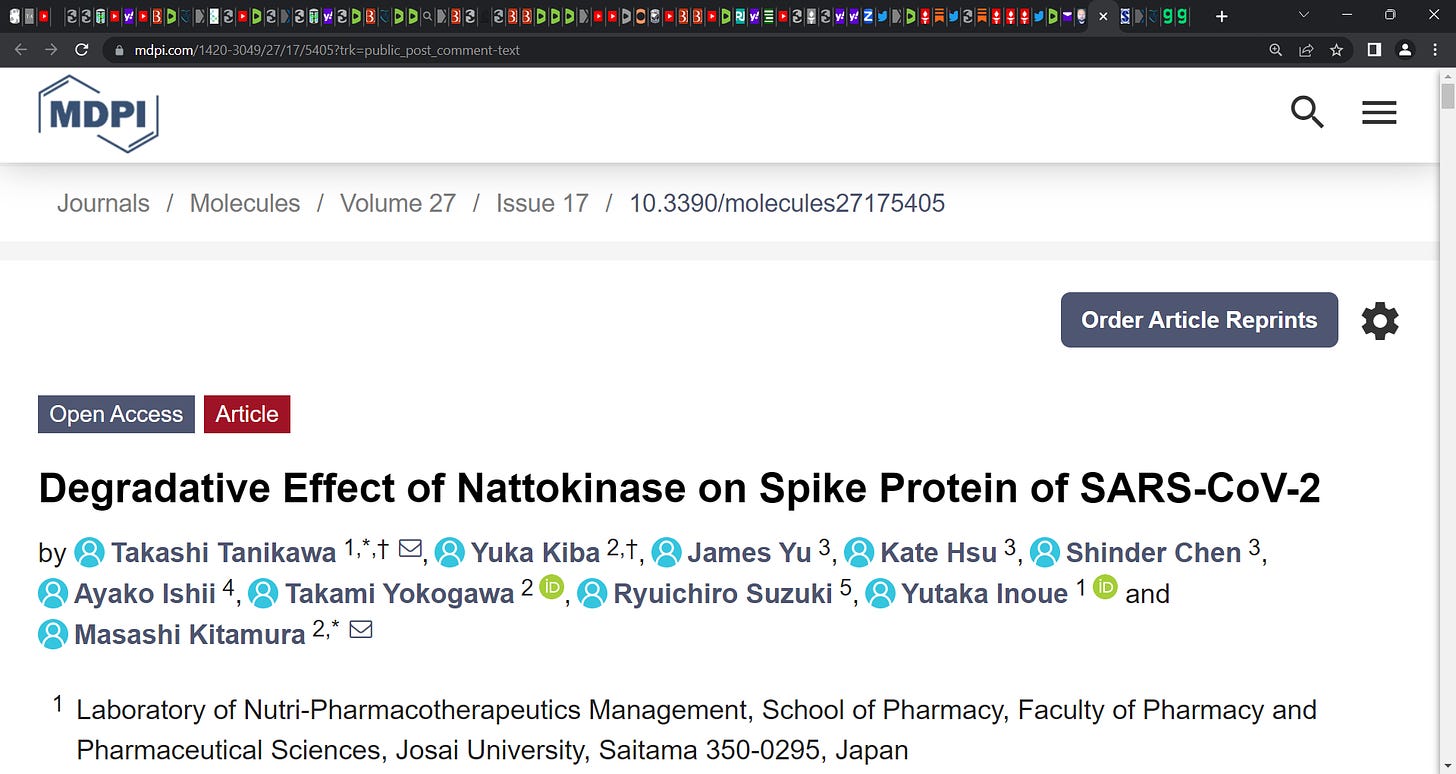
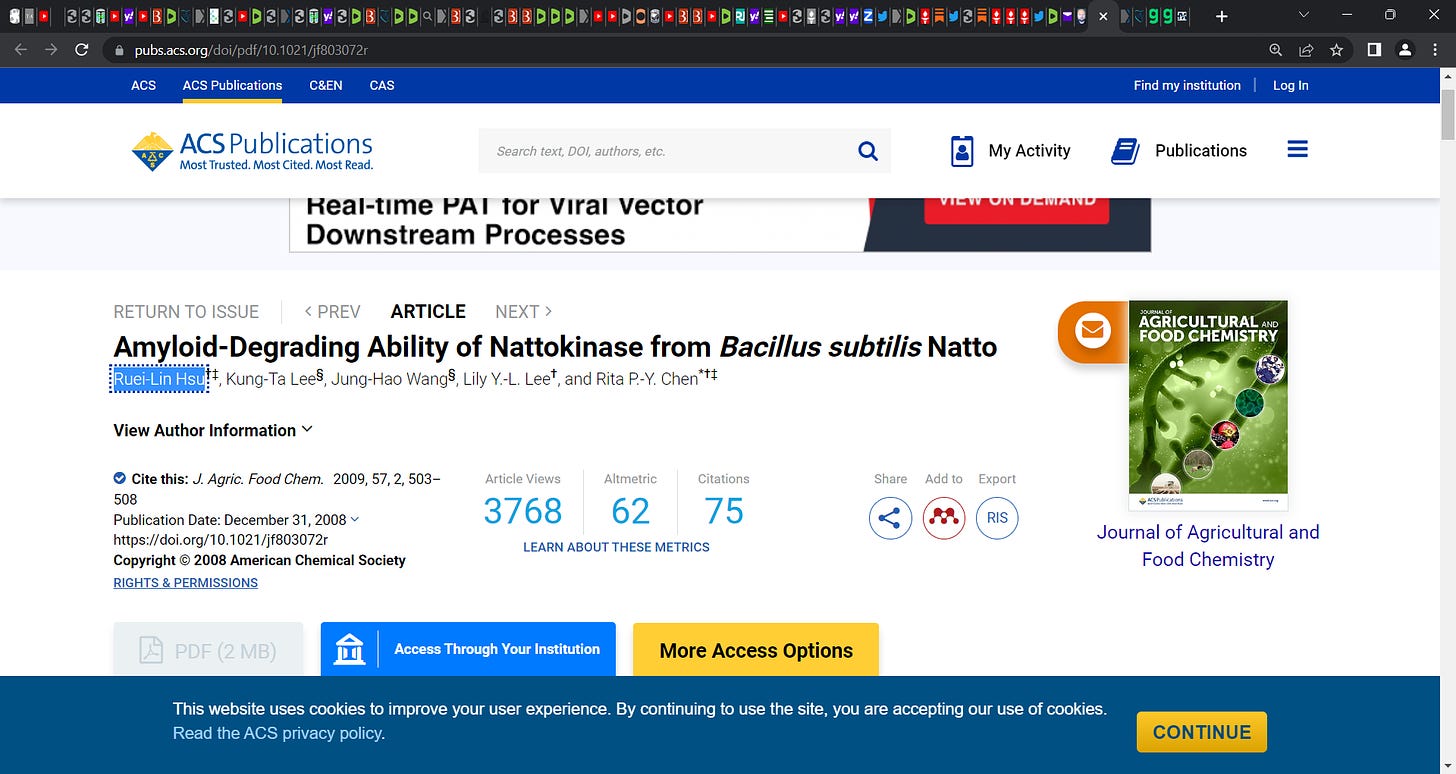
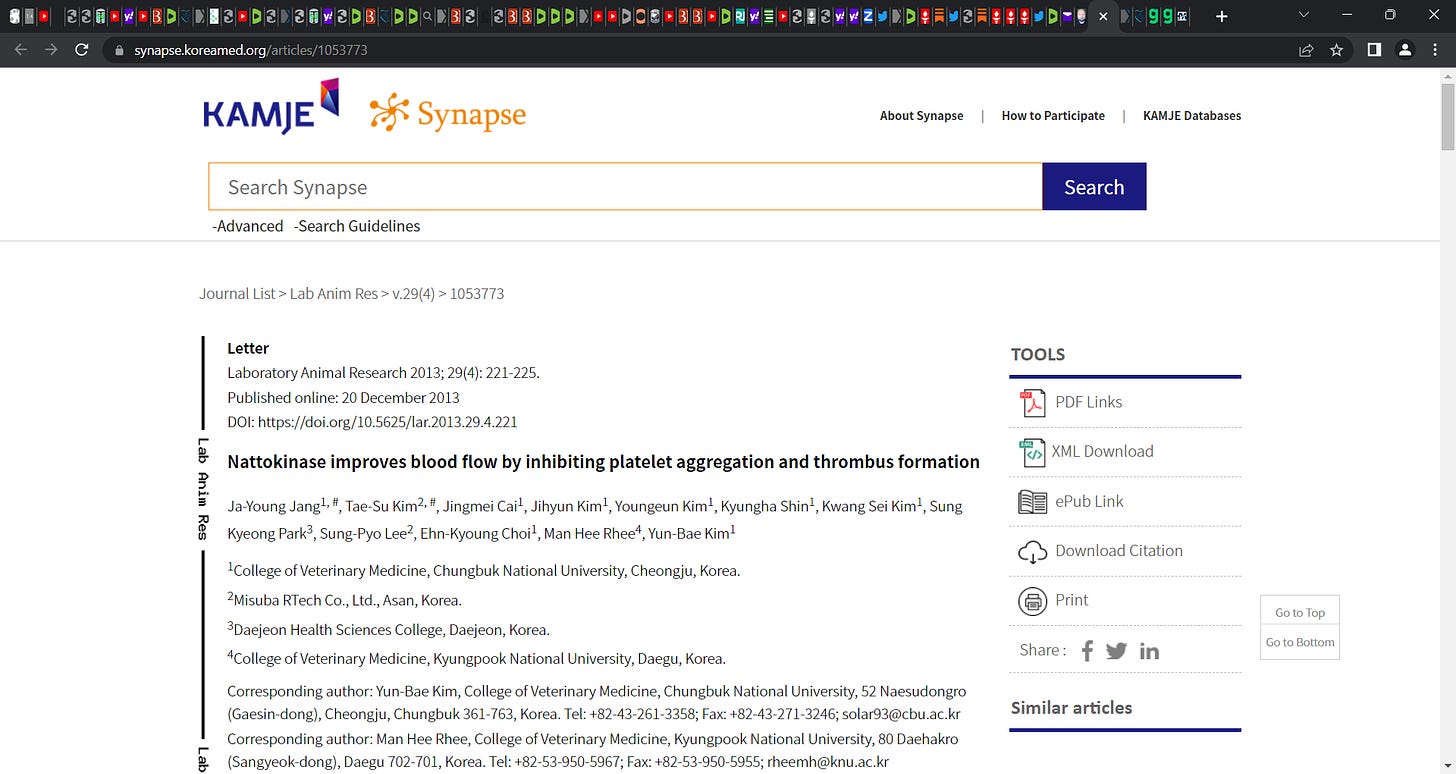
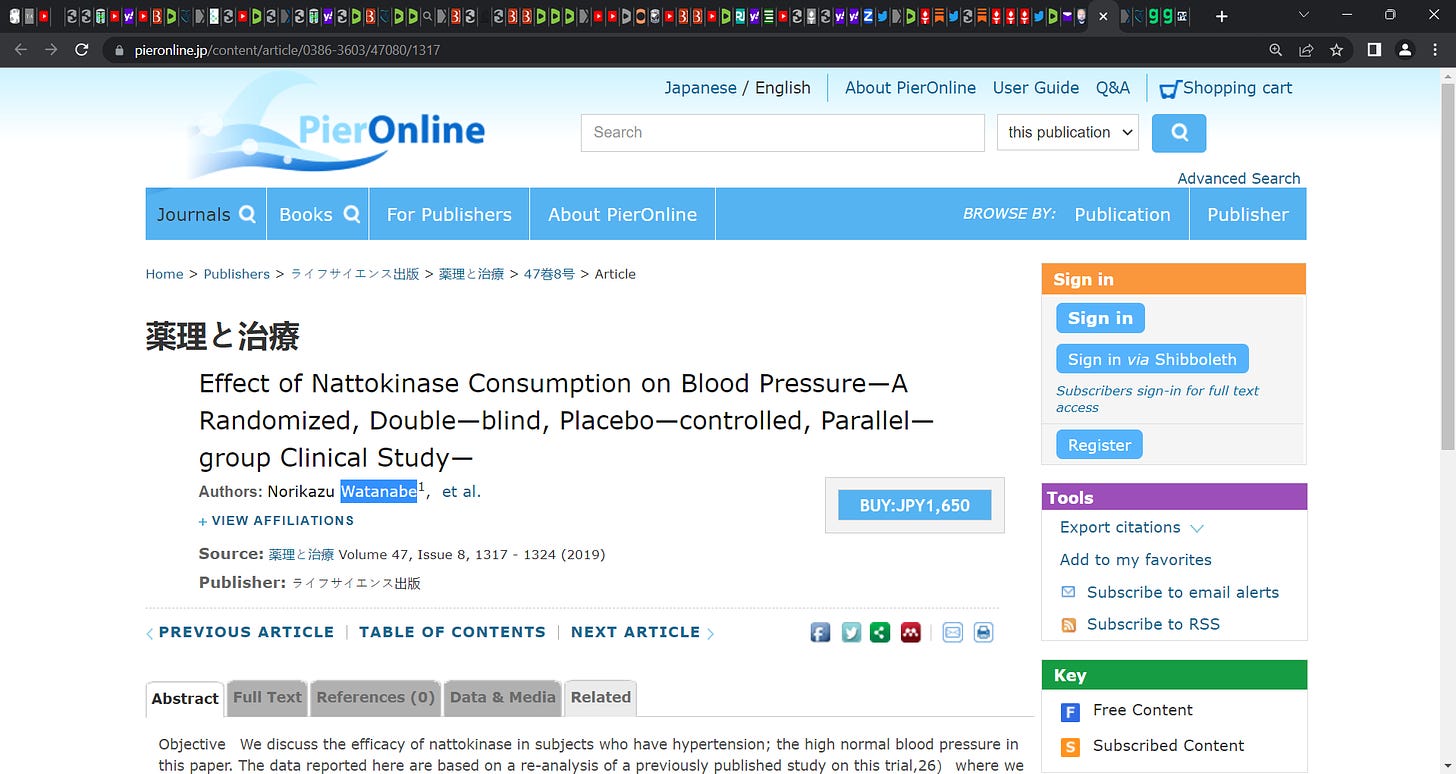

I like the part where it says you should only try this after speaking with the person who told you the jabs were safe;-) What a hoot.
What about the claims nattokinase contains estrogen or increases sensitivity to estrogen as it is made from specially fermented soy? Seem unlikely as it is an enzyme extracted from Natto, specially fermented soy, not fermented soy itself. Can you speak to this Dr. Alexander?